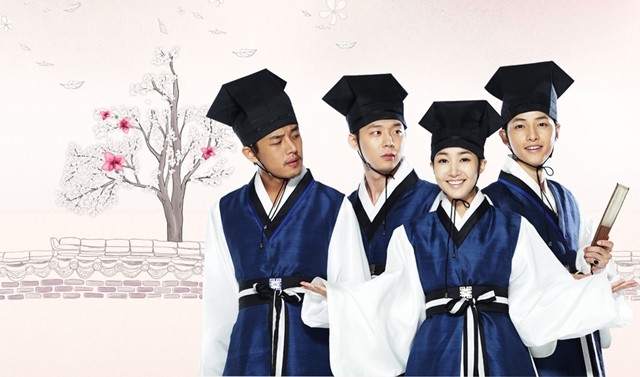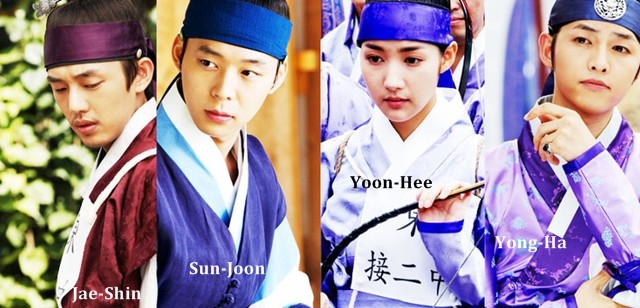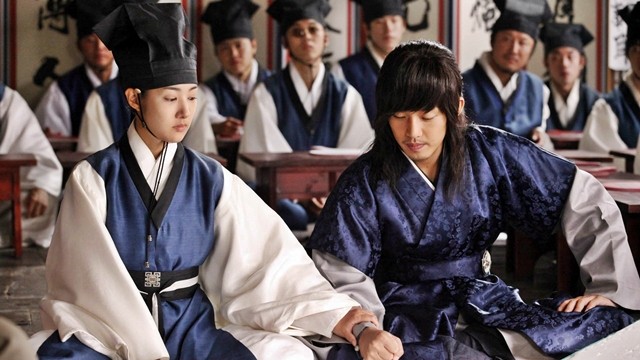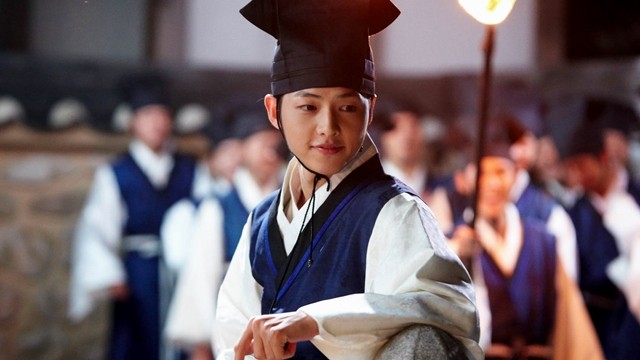
By Jae-Ha Kim
Substack
May 16, 2016
☆☆☆☆
Kim Yoon-Hee / Yoon-Shik (played by Park Min-Young)
Lee Sun-Joon (played by Park Yoo-Chun)
Gu Yong-Ha (played by Song Joong-Ki)
Moon Jae-Shin (played by Yoo Ah-In)
If you commit a crime against a system that is gender biased, is it really a crime? And, just as importantly, should you be punished?
Yoon-Hee is an impoverished girl who is her family’s sole breadwinner. Her father is deceased, and she has a mother and sick younger brother to support. Industrious and smart, Yoon-Hee learns that people will pay her to write their reports and take their exams for them, if they think she’s a boy. So, she borrows her younger brother’s name and disguises herself as Yoon-Shik.
Through a series of circumstances she didn’t initiate, Yoon-Hee finds herself enrolled at the prestigious all-male Sungkyunkwan University. Though she’s well aware that she will be executed if anyone reveals her secret, Yoon-Hee falls in love with the adademic lifestyle, the camaderie and the three square meals a day.
Of course, she will eventually also fall in love with one of her classmates. There’s the richly-dressed and impish Yong-Ha, who loves nothing more than to stir things up. His polar opposite and best friend is the mysterious Jae-Shin, who is a social justice warrior in the literal sense.
Then there’s stoic and straight laced rule follower Sun-Joon, whose world is black and white. He sees no reason for grey. Coming from a privileged background, he has never gone hungry and doesn’t have to worry about rules, because rules were made by and for people like him. When his eyes are opened to poverty and those who have no privileged background to fall back on, that’s when he truly grows up.

Because Yoon-Hee is easily the tiniest student, the other young men give her a hard time at first, nicknaming her girly boy, pretty boy and flower boy. But when she more than holds her own academically and in athletic competitions and, more importantly, wins the favor of the era’s most famous kisaeng, her classmates are under the impression that Yoon-Hee is quite the Romeo and nickname her Big Shot.
“Sungkyunkwan Scandal” is a love story, but it’s also a mystery in many ways, as the Joseon-period Scooby Gang tries to discover a missing scroll that entails the previous king’s wishes for a society without class distinction. It all sounds like a good idea, but if the caste system was eliminated, then what would become of the royal family? Would the king have been willing to live as a commoner?
It wasn’t too long ago that girls were discouraged from continuing their education, and this series makes it painfully obvious what happens to women when they are reliant on men for survival. When her mother is unable to pay her bills, the Minister of War decides that he will take Yoon-Hee instead. Enrolling in Sungkyunkwan allows the education that was denied her, but it also allows her to escape a life where she will at best serve as his concubine.
It’s not a huge surprise to learn that the Minister of War’s son, In-Soo–who happens to be the student body president with a ridiculous amount of authority–becomes Yoon-Hee’s biggest enemy at school.
The question of homosexuality arises when several of the boys are attracted to Yoon-Hee, who they believe is a young man. Questioning his attraction, Sun-Joon asks Yong-Ha if he has ever been attracted to another man. Yong-Ha admits that he was once attracted to Jae-Shin and adds, “Hating people is a sin. How could liking them be one?”
Yessssssssss!

The series goes by quickly and (for the most part) is engrossing. I could’ve done without all of Yoon-Hee’s crying, which made her appear much weaker than her male classmates. In that kind of school situation, her crying would’ve made her ripe for being bullied.
Though she bound her chest to appear male, most women will wonder how she hid her monthly cycle from her roommates. You can suspend your belief in reality to overcome that dilemma, but I wondered why none of her enemies did a little sleuthing of their own. Had they gone to her village and asked around, they would’ve seen the real Yoon-Shik at home with their mother. And even if they didn’t find him, they would’ve learned from Yoon-Hee’s neighbors that they hadn’t seen her in months. It would’ve been easy enough to figure out that the tiny boy at school, who looked like a girl, actually was one.
The ending is satisfying, with everything falling into place as it should. But moreso than the ending, my favorite scene was when her brother revealed to Yoon-Hee that their father wanted her to learn, but didn’t know how to do so in a society that made it illegal for girls to obtain higher education. (The real) Yoon-Shik pointed out that when he was a toddler, their father would read to him, always picking higher level books than he could understand. Sitting by the door with him on his lap, their father would read in a loud voice so that Yoon-Hee could listen to the lessons as she waited outside. The lessons weren’t for Yoon-Shik, but for her.
Gay rights:
It was interesting to me that though homosexuality was treated as an aberration–as it would’ve been during the Joseon era–the writers also pointed out that more important than punishing “deviants” was understanding and loving everyone, regardless of their sexual orientation. In a day when homosexuality is still treated as a perversion in Korea and, yes, in many parts of the U.S. as well, it is heartwarming to see these Korean dramas present it is something that just is. You don’t choose to be gay, just as you don’t choose to be born.
Frustration:
Whenever someone became angry, but had to present an even-keeled persona, they balled their fists up in frustration. I enjoyed this, because it’s something little kids do; and it made some of the more unlikable characters a bit more human.

You may recognize:
• Many new Song Joong-Ki fans sought this drama out after watching him in “Descendants of the Sun.” Coincidentally, he is a graduate of the real Sungkyunkwan University.
• Kim Min-Seom, who played the hated Queen Bo-Kyung in the “Moon Embraces the Sun,” portrays a much more sympathetic character here: a highly cultured, but low-caste kisaeng named Cho-Sun. When Yoon-Hee, dressed as a boy, shows her kindness, Cho-Sun falls in love with her.
• Kim Mi-Kyung portrays Yoon-Hee’s mother. In “The Master’s Sun,” she played So Ji-Sub’s fashionable aunt.
• In this series, Ahn Nae-Sang plays a professor, who knew and respected Yoon-Hee’s father. In the “Moon Embraces the Sun,” he portrayed Kim Soo-Hyun’s father — the king.
Airdates:
This 20-episode Korean drama aired from August 30 to November 2, 2010 on KBS2.
Spoiler alert:
Yoon-Hee’s father was a revered Sungkyunkwan professor who was killed while carrying out a mission for the king. It’s not clear why her mother kept this tidbit from Yoon-Hee and her brother, but it was most likely to protect their lives. He and Jae-Shin’s older brother were murdered while trying to help the king implement plans for a country where there were no class distinctions.
What’s puzzling is the fact that Yoon-Hee’s father had ties to the king and Sungkyunkwan University, and yet no one helped out his family after his death. The least the king could’ve done was ensured that his widow and children would have a a roof over their heads and food on the table.
In episode 15, Sun-Joon tries to revive Yoon-Hee, who he rescued after she fell in the river. When he opens her shirt, her bound bosom is revealed. Now, he knows that she is a girl.
The final episode shows that In-Soo — the evil student body president — is capable of showing humanity to those he love. When his father tries to strike Cho-Sun, In-Soo defies him to protect her.
@2016 Jae-Ha Kim | All Rights Reserved
I like it because it is different other drama and
All actors are so handsome
I didn’t see this one. Was it a good drama?
You will love the story
Like it so much that drama …
One of my ALL TIME FAVORITE Kdramas! My Bias from JYJ (Park Yuchun) in the leading role!
Miss this drama !!!! First Korean drama I watch
Starting points in love in Korean drama
SAME! One of my all time fave dramas!
Have a question, two actually? How do two characters in the series wonder if the boy is actually a girl just by taking the pulse? At least that’s what they seemed to be doing: holding her wrist.
The other question: what is the silver object that she looks for after being brought to the teacher for first aid? Is this something only girls carry?
To your first question – yes, that’s how I understood the scene as well – that the Professor was able to tell she was a girl based on her pulse. I did just google “pulse of woman vs man” and it looks like there may be a basis for this kind of thinking.
To your second question – yes it is. It’s the hair ornament that her mom gave her.